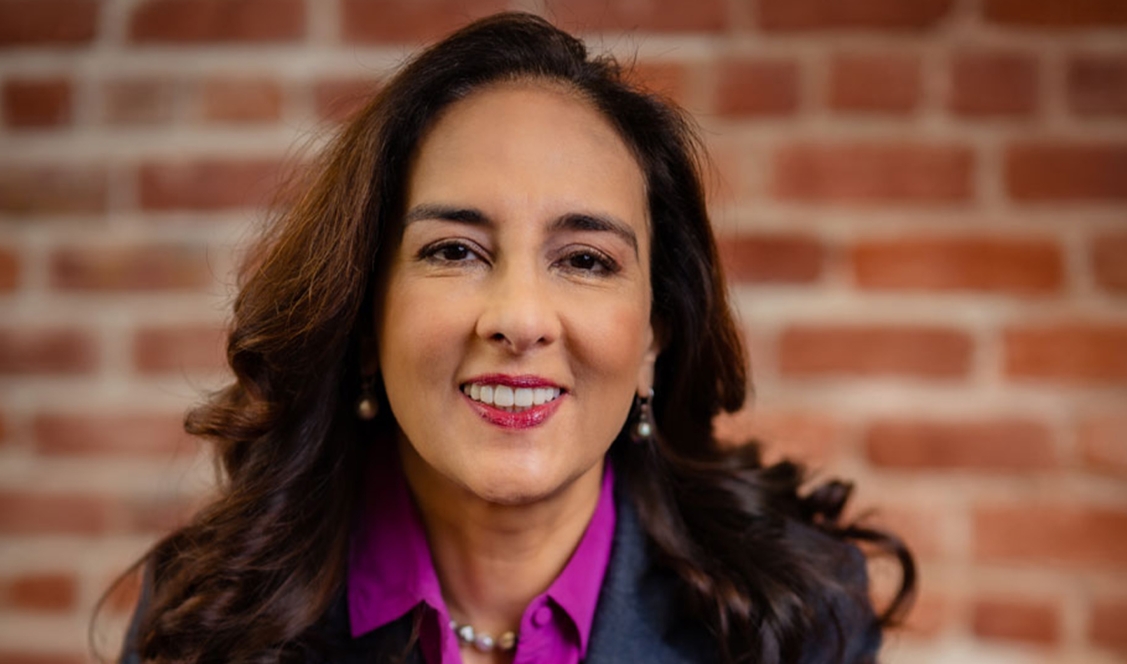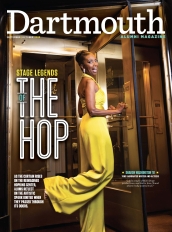Harmeet Dhillon has come a long way since her days as editor of the conservative Dartmouth Review. In April, the U.S. Senate confirmed her as assistant attorney general for civil rights, putting her in charge of protecting the civil rights of all Americans, including college students. Now, she’s in the thick of the Trump administration’s crackdown on leading universities such as Harvard and Columbia for alleged antisemitism and other offenses. The New Yorker magazine this summer described Dartmouth as “the Switzerland” in the showdown, staying mostly neutral, while Robert Reich ’68 said a better comparison would be the Hitler-appeasing Neville Chamberlain. In a wide-ranging interview with DAM, Dhillon had a different description for Dartmouth: She called it “one of the good guys.”
Why was this a job you wanted to take on?
I have been a civil rights lawyer my entire career. Dating back to my days at Dartmouth, I was a First Amendment activist and notorious in the history of Dartmouth. I was premed when I arrived at Dartmouth, but all the work I did involving free speech and being a journalist led me down the path to law school. I’ve taken on pro bono cases to represent people suffering religious violence and political oppression in other countries. I have successfully represented numerous people in asylum cases in the United States. And that work is really important to me, to represent individuals who are oppressed and really have no recourse.
You have a civil rights background—including work with the ACLU to protect Sikhs in the United States.
Yeah, not just Sikhs but all people who were discriminated against in the wake of 9/11. I was on the board of the American Civil Liberties Union’s Northern California chapter, which is one of the biggest in the United States. They invited me to join the board because of my activism on behalf of the Sikh community. I don’t think they paid attention to my political background.
Being a conservative in the Bay Area must have put you in a pretty small minority.
Look, I am a minority. In India, as a Sikh, we’re only less than 2 percent of the population. I grew up in the Deep South. There were Klan signs on the highway where I grew up. I’m used to being an outsider. My superpower is not really caring what people think about me.
How did your experience at Dartmouth and as editor of The Review inform your career?
I was a conservative, philosophically and religiously, when I went to Dartmouth at age 16. But what was great at Dartmouth was the fellowship of friends and the discussions with a lot of different viewpoints exchanged. And the unique experience I had there was being a journalist trying to document some of the things that I thought were kind of crazy on the campus—the far-left activism. My colleagues getting suspended for journalism—I found that shocking. [In 1988, three members of The Review were suspended over a clash with a Black music professor.] That was a landmark event in my life. We ended up suing Dartmouth with the help of lawyers from the ACLU who believed in free speech. That really changed the path of my career into law.
How do you see your office approaching civil rights issues with respect to universities?
I have written letters from this desk to the top 25 colleges in the United States. It’s well publicized that this administration is taking aim at institutions that are failing to follow the rulings by the Supreme Court. Certainly, racially and religiously biased admissions are problematic. Those practices need to be eradicated, according to the Supreme Court.
What do you say to those who are skeptical about your approach?
People should step out of their little boxes. I’m a bootstrap immigrant who started my own law firm and created jobs for American citizens. If they look at my record, they should be comforted by the work we’ve done so far. The traditional work—representing victims of police violence, of fire-bombing churches, we take on disability discrimination cases—that’s traditional civil rights work. Of the millions of things I can tackle, a lot of those things are going to be the same and some things are going to be different. It’s bipartisan. And to be very clear, the Department of Justice is a nonpartisan organization. I resigned from the Republican National Committee and all the political work that I do.
Is it refreshing to step away from politics?
Believe me! I needed a little break from Republican politics. All politics.
[Eight weeks into Dhillon’s tenure, DAM spoke with her again.] At this stage, a few months into your role, what have you set in motion?
We’re taking the lead in the government’s work to combat discrimination in America’s universities. Every day is a new challenge. Every day there are civil rights violations that come across our desk, and we have to prioritize our resources and figure out how to deal with them. The other thing that’s novel, we’re forming a Second Amendment section of the Civil Rights Division. That’s never been done before.
You’ve recently made moves to cancel consent decrees with police departments in Minneapolis and Louisville, Kentucky. Would you explain those decisions?
You have to start with the assumption that some things that have been tried over time have worked—and some haven’t. And one of the things that hasn’t worked is police consent decrees. We have a number of tools to combat excessive force and other misconduct by law enforcement officials, including prosecuting them. We support holding police accountable for their misconduct. What hasn’t worked is forcing an entire community to pay for the sins of a couple of cops. So we’ll be examining all the consent decrees out there to determine whether they should be continued or scale them back.
One issue since you took charge is the turnover in the office. Why are lawyers leaving?
When I came into this office, I did an assessment of what was going on here, and it was very clear to me that the vast majority of this department was used to doing things their way and didn’t really change their ways no matter who was the president. And it was a very politically motivated, one-sided approach to statutes that are meant for all Americans, not just some Americans. So I made it very clear that the priorities of enforcement in this administration were going to continue to be to enforce federal civil rights laws but in a more even-handed fashion, consistent with the president’s executive orders. That caused over 200 lawyers to decide that they’d like to make their careers elsewhere. And that’s fine.
I imagine that degree of turnover means you’re going to put a pretty significant stamp on this agency.
That’s the goal.
Given all that’s going on in immigration, where does your division fit in, in terms of how deportations are handled, how people who are citizens are treated?
We have zero role in deportations. I remind people—I’m an immigrant. When you go through that immigration process, if you have a student visa or a green card, you don’t have the same license to express your views as American citizens do. That’s just a fact.
You were quoted in the May/June 2013 issue of DAM saying that you don’t support the idea of rounding people up and deporting them. Am I missing some context there?
You’re definitely missing a piece of context. We’ve been under an invasion in the United States. There’s no question that millions of illegal aliens were brought into this country in recent years, and it’s an untenable situation. Violence, anarchy, criminals with records in their home countries—that is a very different picture of immigration than Ronald Reagan’s amnesty. I fully support the deportation of people who are in this country illegally. I fully support everything this administration is doing to enforce our immigration laws. I don’t know what old news quote you’re looking at. I’m in this moment of time now. So I prefer to highlight my very strong views on all of these issues that are current. Times have changed.
You’ve engaged with Dartmouth since we last spoke. How is that going?
Look, I’m proud that Dartmouth is leading the way in dealing with antisemitism and campus unrest. I never thought I’d say those words. But I have to say, compared to the other Ivy League schools that I’m dealing with on a daily basis, Dartmouth is really one of the good guys. And I hope it stays that way.
Matthew Mosk is senior investigative editorial director at CBS News.





